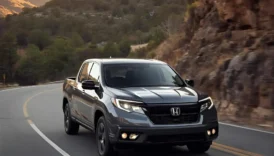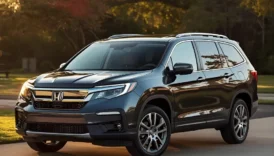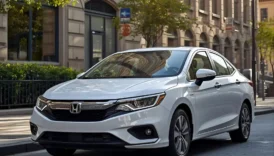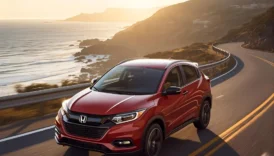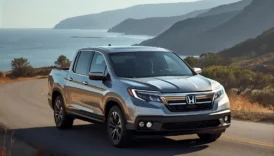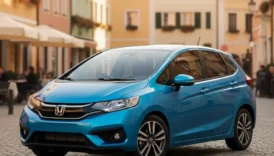2024 Honda e: Smart Electric Urban Features
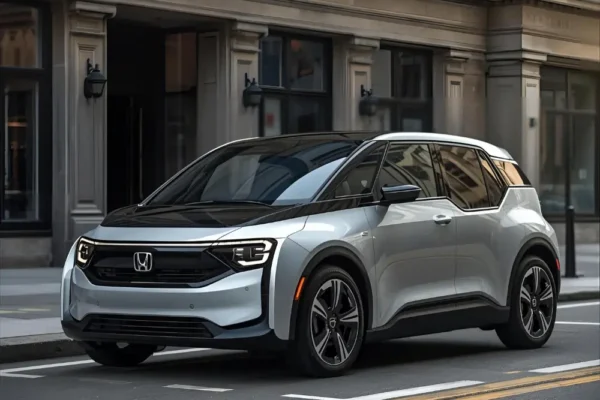
- 2024 Honda e: Smart Electric Urban Features
- What’s New in the 2024 Honda e
- Exterior Refinements and Urban Design Updates
- Powertrain Enhancements and Software Improvements
- Interior Technology and Digital Upgrades
- Highlights
- Powertrain and Real-World Electric Performance
- Electric Motor and Battery Configuration
- Driving Efficiency and Range Improvements
- Real-World Driving Feel
- Performance Highlights:
- Highlights
- Driving Experience, Ride Comfort, and Handling
- Urban Driving and Ride Quality
- Driving Modes and Responsiveness
- Cabin Comfort and Acoustic Refinement
- Handling and Stability
- Highlights
- Driving Summary
- Interior Design, Space, and Technology Experience
- Cabin Design and Layout
- Seating and Comfort
- Technology Integration and Displays
- Storage and Practical Features
- Highlights
- Safety and Driver Assistance Systems
- Honda Sensing Suite: Intelligent Assistance for Every Drive
- Passive Safety and Structural Engineering
- Enhanced Visibility and Driver Awareness
- Safety Ratings and Real-World Security
- Key Safety Highlights:
- Highlights
- Infotainment, Connectivity, and Smart Features
- Dual-Screen Infotainment System
- Connectivity and Smart Integration
- Honda Personal Assistant
- Sound and Cabin Experience
- Key Infotainment Highlights:
- Highlights
- Efficiency, Range, and Charging Technology
- Electric Range and Real-World Performance
- Charging Options and Times
- Regenerative Braking and Efficiency Systems
- Environmental and Sustainability Performance
- Efficiency Highlights:
- Highlights
- Dimensions, Urban Practicality, and Cargo Solutions
- Exterior Dimensions and Compact Structure
- Interior Space and Cabin Practicality
- Cargo Volume and Versatile Storage
- Urban Usability and Everyday Functionality
- Key Practical Highlights:
- Highlights
- Common Issues, Reliability, and Battery Longevity
- Overall Reliability and Build Quality
- Common Minor Issues
- Battery Longevity and Health
- Owner Feedback and Real-World Insights
- Key Reliability Highlights:
- Highlights
- Maintenance, Service Intervals, and Ownership Experience
- Simplified Maintenance Schedule
- Ownership Costs and Value Retention
- Charging and Everyday Usability
- Real-World Ownership Feedback
- Key Ownership Highlights:
- Highlights
- Frequently Asked Questions About the 2024 Honda e
- What is the driving range of the 2024 Honda e?
- How long does it take to charge the 2024 Honda e?
- Is the 2024 Honda e suitable for long trips?
- What are the main advantages of the Honda e’s rear-wheel-drive system?
- How reliable is the 2024 Honda e in long-term ownership?
- Does the Honda e support smartphone integration?
- What safety systems are included in the 2024 Honda e?
- How often does the Honda e require servicing?
- What is the cargo capacity of the 2024 Honda e?
- Is the 2024 Honda e worth buying?
The 2024 Honda e represents Honda’s vision of compact, urban electric mobility redefined for the modern age. Designed specifically for city driving, this fully electric hatchback blends futuristic design with practicality, offering an experience that feels both premium and effortless. Powered by a 35.5 kWh lithium-ion battery and a single rear-mounted electric motor, the Honda e delivers 134 hp and 315 Nm of torque, ensuring smooth yet agile performance for everyday commuting. Its rear-wheel-drive layout gives it exceptional maneuverability in tight spaces, while the ultra-short turning radius enhances confidence in dense traffic. Inside, the dual-screen digital cockpit, minimalist dashboard, and eco-friendly materials create an atmosphere of calm modernity. With seamless smartphone integration, fast-charging capability, and an emphasis on sustainability, the 2024 Honda e stands out as an intelligent electric city car that embodies Honda’s engineering precision and environmental responsibility.
What’s New in the 2024 Honda e
The 2024 Honda e refines the formula that made Honda’s first fully electric city car such an engineering showcase. While the exterior design and platform remain familiar, this new iteration focuses on greater efficiency, software refinement, and everyday practicality. The updates enhance range, digital connectivity, and driver assistance technology—cementing the Honda e’s reputation as one of the most forward-thinking urban EVs on the market.
Exterior Refinements and Urban Design Updates
The 2024 Honda e retains its distinctive retro-modern look, but subtle exterior enhancements improve functionality and aerodynamics. The circular LED headlights, flush door handles, and symmetrical design language give it a unique identity that stands out in crowded cityscapes. Honda’s engineers have also optimized the front and rear fascia to reduce drag and improve energy efficiency without compromising the car’s signature styling.
| Design Feature | 2024 Update |
|---|---|
| Headlights | Revised LED optics for better illumination and reduced energy draw |
| Wheels | New lightweight 17-inch aero alloys for improved efficiency |
| Color Palette | Added Urban Sky Blue and Pearl Mist White finishes |
| Door Handles | Refined flush-fitting design for better airflow |
| Charging Port | Faster Type 2 AC and CCS DC compatibility |
The compact footprint, short overhangs, and near-perfect 50:50 weight distribution make the Honda e ideal for maneuvering through narrow city streets and tight parking spaces.
Powertrain Enhancements and Software Improvements
Underneath the familiar layout, the 2024 model introduces several performance and efficiency optimizations. The 35.5 kWh lithium-ion battery remains the same size, but improved thermal management enhances range consistency in extreme temperatures. Combined with the rear-mounted 134 hp (100 kW) electric motor, the car accelerates from 0 to 100 km/h in just 8.3 seconds, maintaining the brisk, silent responsiveness EV drivers appreciate.
Battery durability has also been improved, with an upgraded battery management system (BMS) that regulates charge cycles more efficiently. This reduces degradation over time and helps maintain battery health beyond 160,000 km.
Interior Technology and Digital Upgrades
The 2024 Honda e introduces a refreshed version of Honda’s connected interface software, now faster and more intuitive. The dual 12.3-inch horizontal displays receive upgraded resolution and a revised menu system for smoother operation. Voice recognition has also been enhanced, allowing more natural speech commands for navigation, entertainment, and climate control.
The cabin continues to impress with its minimalist aesthetic—natural wood accents, soft fabrics, and clean lines that emphasize relaxation. New seat materials, made from sustainable textiles, contribute to Honda’s eco-friendly design philosophy.
Highlights
- Refined LED lighting design and aerodynamic exterior
- Updated 17-inch lightweight wheels improving efficiency
- Enhanced battery management and temperature control
- Upgraded infotainment software and voice assistant responsiveness
- Sustainable interior materials with a premium finish
The 2024 Honda e stands as a long-tail keyword example of a compact electric city car with advanced software, refined range, and futuristic design. It evolves intelligently rather than radically—offering subtle improvements that elevate both its practicality and premium appeal while keeping Honda’s distinctive electric identity intact.
Powertrain and Real-World Electric Performance
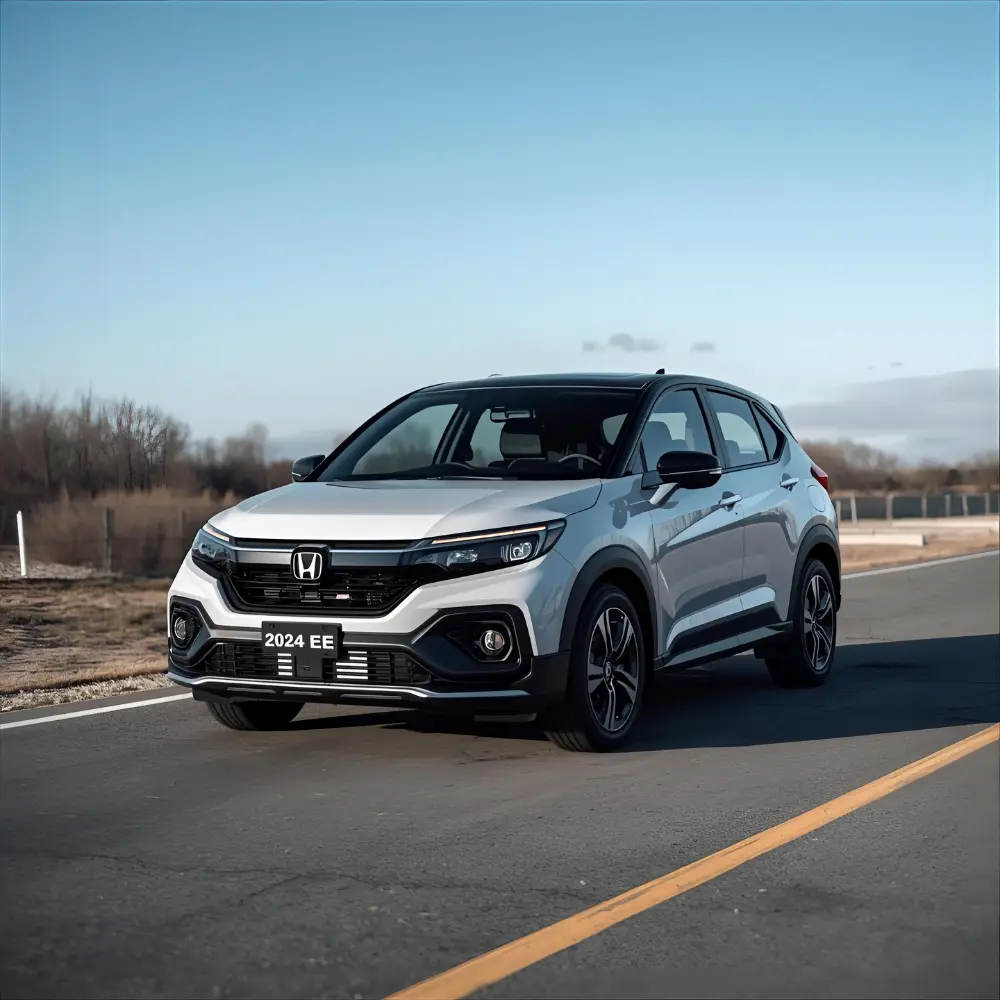
The 2024 Honda e showcases Honda’s refined approach to compact electric mobility, focusing on efficiency, responsiveness, and an engaging driving character. Unlike many small EVs that prioritize minimalism at the cost of driving enjoyment, the Honda e delivers both agility and refinement. Its rear-wheel-drive layout, low center of gravity, and advanced power management system make it one of the most enjoyable city EVs to drive—balancing instant torque with precision control.
Electric Motor and Battery Configuration
At its core, the 2024 Honda e retains the trusted 35.5 kWh lithium-ion battery paired with a single rear-mounted electric motor. This setup provides seamless power delivery and rear-biased dynamics rarely found in its class. The motor produces 134 horsepower (100 kW) and 315 Nm of torque, allowing brisk acceleration from standstill while maintaining silent, vibration-free operation.
| Component | Specification |
|---|---|
| Motor Type | Permanent Magnet Synchronous Motor (rear-mounted) |
| Power Output | 134 hp (100 kW) |
| Torque | 315 Nm |
| Battery Capacity | 35.5 kWh lithium-ion |
| Drive Type | Rear-Wheel Drive (RWD) |
| 0–100 km/h | 8.3 seconds |
| Top Speed | 145 km/h |
This compact yet powerful configuration gives the Honda e a distinctly dynamic feel compared to front-wheel-drive competitors. The instant torque delivery ensures effortless acceleration from traffic lights, while regenerative braking enhances control and energy recovery during urban driving.
Driving Efficiency and Range Improvements
While the battery capacity remains unchanged from earlier models, Honda engineers have fine-tuned the battery management system (BMS) and thermal cooling circuit to maintain consistent performance. The 2024 Honda e offers an estimated 220 km of real-world range—a slight improvement thanks to more efficient software calibration and reduced rolling resistance from new tires.
Charging is handled via Type 2 AC and CCS DC fast-charging ports. With a DC fast charger, the Honda e can reach 80% charge in just 30 minutes, while a standard 6.6 kW AC home charger achieves a full charge in approximately 5 hours.
| Charging Method | Time to 80% | Time to 100% |
|---|---|---|
| 50 kW DC Fast Charger | 30 minutes | 45 minutes |
| 11 kW AC Wallbox | 3.5 hours | 5 hours |
| 2.3 kW Household Plug | 16 hours | 19 hours |
The car’s regenerative braking system also plays a crucial role in real-world efficiency. Adjustable via steering-mounted paddles, it allows drivers to control deceleration intensity, enabling near one-pedal driving in dense traffic—recapturing energy each time the accelerator is released.
Real-World Driving Feel
What makes the 2024 Honda e special is its effortless, precise, and playful driving character. Thanks to its rear-wheel-drive layout, steering remains light and responsive, unburdened by torque interference. The 50:50 weight distribution and independent suspension deliver composed handling even on uneven urban roads.
In Sport mode, throttle response sharpens and steering weight increases slightly, providing a more connected experience. In Normal mode, power delivery becomes smoother and regenerative braking is moderated for a relaxed drive.
Performance Highlights:
- Instant torque response from rear-mounted motor
- 220 km real-world range with improved energy management
- DC fast charging to 80% in 30 minutes
- Balanced 50:50 weight distribution for dynamic handling
- Adjustable regenerative braking for efficient energy recovery
Highlights
The 2024 Honda e stands as a long-tail keyword reference for a compact electric car with agile rear-wheel-drive performance and efficient range. It merges everyday practicality with engaging dynamics, offering smooth power delivery and intuitive energy management—making it a standout in the growing world of urban EVs.
Driving Experience, Ride Comfort, and Handling
The 2024 Honda e delivers a driving experience that goes beyond efficiency—it’s designed to make urban commuting genuinely enjoyable. By combining a compact footprint, low center of gravity, and balanced weight distribution, Honda has created one of the most refined and agile small electric cars available today. It is responsive without being aggressive, quiet without feeling disconnected, and comfortable without sacrificing precision.
Urban Driving and Ride Quality
Honda engineered the e with city life in mind. Its rear-wheel-drive layout gives it a remarkably tight 4.3-meter turning radius, allowing drivers to perform U-turns or parking maneuvers with ease. The electric power steering system offers excellent precision, delivering smooth feedback at low speeds while maintaining light effort for tight navigation.
| Driving Element | Specification / Benefit |
|---|---|
| Turning Radius | 4.3 m |
| Steering Type | Electric Power Steering (EPS) |
| Suspension | Independent MacPherson Strut (front and rear) |
| Weight Distribution | 50:50 front to rear |
| Drive Layout | Rear-Wheel Drive (RWD) |
The independent suspension system—MacPherson struts at both front and rear—absorbs imperfections in the road gracefully, making the HR-V feel stable and composed even on uneven city streets. Unlike many small EVs that ride harshly due to their short wheelbase, the Honda e’s chassis tuning emphasizes balance and comfort.
Driving Modes and Responsiveness
The 2024 Honda e offers two main drive modes: Normal and Sport.
- Normal mode optimizes energy efficiency and softens throttle response for smooth, relaxed driving.
- Sport mode unlocks sharper accelerator mapping and increased steering weight, giving drivers instant torque response and greater road feedback.
The single-speed transmission ensures uninterrupted acceleration, while regenerative braking intensity can be adjusted through steering-mounted paddles—enabling a customizable one-pedal driving feel. This function enhances control in stop-and-go traffic and improves overall energy recovery efficiency.
Cabin Comfort and Acoustic Refinement
One of the most remarkable qualities of the Honda e is its serene interior environment. The electric motor operates almost silently, while Active Sound Insulation and acoustic windshield glass minimize external noise. Combined with soft suspension damping and high-quality cabin materials, the ride feels premium for a car in this segment.
Even on rough roads, the low-mounted battery pack contributes to excellent ride composure by lowering the center of gravity and reducing body roll. The result is an SUV-like confidence with hatchback maneuverability.
Rear passengers benefit from excellent seating support and surprising legroom, given the compact dimensions. Honda’s design ensures that comfort extends to every occupant, not just the driver.
Handling and Stability
Because the Honda e sends power to the rear wheels, steering remains free of torque pull—creating a purer, more balanced handling experience. The traction control system and Vehicle Stability Assist (VSA) work seamlessly with the low-mounted battery to maintain stability even during rapid acceleration or slippery conditions.
| Feature | Function |
|---|---|
| Vehicle Stability Assist (VSA) | Maintains traction and directional control |
| Anti-Lock Braking System (ABS) | Prevents wheel lock during emergency braking |
| Brake Assist | Enhances stopping power under hard braking |
| Low Center of Gravity | Improves agility and cornering balance |
Highlights
- Rear-wheel-drive configuration for pure, agile handling
- 4.3 m turning radius ideal for urban environments
- MacPherson suspension on all corners for balanced comfort
- Quiet, premium ride quality with excellent insulation
- Sport and Normal drive modes with adjustable regeneration
Driving Summary
The 2024 Honda e stands as a long-tail keyword benchmark for a compact electric car with agile handling, exceptional comfort, and refined driving balance. It combines the fun of rear-wheel dynamics with everyday usability, redefining what city driving feels like in an EV—smooth, precise, and genuinely enjoyable.
Interior Design, Space, and Technology Experience
The 2024 Honda e delivers a minimalist yet technologically rich interior that perfectly complements its futuristic exterior. Every element inside the cabin has been designed to enhance comfort, connectivity, and intuitive control. Honda’s approach focuses on blending human-centered ergonomics with digital sophistication—creating a space that feels as intelligent as it looks.
Cabin Design and Layout
The Honda e’s cabin is a masterclass in simplicity and efficiency. The dashboard stretches horizontally, integrating dual 12.3-inch high-resolution displays that function as a unified infotainment and control hub. A smaller 8.8-inch driver display sits directly behind the steering wheel, presenting essential information such as range, energy flow, and navigation details.
| Interior Feature | Description |
|---|---|
| Dashboard | Full-width dual 12.3-inch LCD touchscreen system |
| Driver Display | 8.8-inch digital instrument cluster |
| Steering Wheel | Two-spoke multifunction design |
| Upholstery | Eco-friendly recycled polyester fabric |
| Accents | Real wood trim and soft-touch panels |
The design aesthetic blends retro-inspired charm with modern technology. Real wood accents and soft-touch surfaces give warmth to the cabin, while concealed ambient lighting enhances the lounge-like atmosphere. The open, airy layout makes the Honda e feel more spacious than its dimensions suggest.
Seating and Comfort
Seating is designed to mimic living-room comfort. The front seats feature wide cushions and soft padding for relaxed posture, while the flat floor design creates abundant legroom for both rows. The rear bench comfortably accommodates two adults, with enough space for short trips or city commuting.
The materials are sustainably sourced, featuring eco-friendly upholstery made from recycled polyester fibers. Honda also uses low-emission adhesives and coatings to reduce the vehicle’s environmental footprint.
| Seating Configuration | Specification |
|---|---|
| Capacity | 4 passengers |
| Seat Type | Manual adjustment front, fixed rear |
| Upholstery Options | Fabric or sustainable leatherette |
| Rear Seats | 60:40 split-folding for cargo expansion |
Technology Integration and Displays
The dual-screen interface is the centerpiece of the Honda e’s interior experience. The left display can function as a dedicated media or navigation screen, while the right can show energy consumption data, charging status, or entertainment apps. The system supports Apple CarPlay, Android Auto, Bluetooth streaming, and Wi-Fi hotspot functionality.
The dashboard’s integrated digital side mirrors—a signature feature of the Honda e—display real-time footage from exterior cameras on small 6-inch screens at both ends of the dash. This not only reduces drag but also enhances safety and visibility in poor weather conditions.
Voice control functionality has been improved for 2024, allowing natural language commands such as “Find nearest charging station” or “Set temperature to 22 degrees.”
Storage and Practical Features
Despite its compact size, the Honda e is cleverly packaged for urban living. Storage compartments include door bins, a deep center console with removable trays, and a floating platform under the dashboard for personal items.
| Practical Element | Detail |
|---|---|
| Cargo Capacity (Seats Up) | 171 liters |
| Cargo Capacity (Seats Down) | 861 liters |
| Interior Storage | Multi-level center console with wireless phone charger |
| Charging Ports | Two USB-C, one USB-A, and 12V outlet |
Highlights
- Dual 12.3-inch screens for infotainment and system control
- Digital side mirrors for enhanced visibility and efficiency
- Eco-friendly materials with premium craftsmanship
- Spacious, minimalist cabin with smart storage solutions
- Voice control and wireless smartphone integration
The 2024 Honda e stands as a long-tail keyword example of a compact electric car with futuristic interior technology and sustainable comfort design. It merges luxury-like innovation with simplicity, creating a digital yet human-centered cabin tailored for urban life.
Safety and Driver Assistance Systems
The 2024 Honda e maintains Honda’s commitment to safety innovation through a full suite of intelligent driver-assistance systems and robust structural protection. Despite its compact footprint, the car integrates technologies designed to prevent collisions, protect occupants, and simplify urban driving. The combination of Honda Sensing features, enhanced visibility tools, and a reinforced safety architecture ensures that the Honda e feels secure in any city environment.
Honda Sensing Suite: Intelligent Assistance for Every Drive
The 2024 Honda e comes equipped with an updated version of the Honda Sensing suite—Honda’s advanced package of active safety and driver-support technologies. These systems continuously monitor traffic, road edges, and pedestrian movement through radar and camera sensors, intervening when necessary to help prevent or mitigate potential collisions.
| Feature | Function | Benefit |
|---|---|---|
| Collision Mitigation Braking System (CMBS) | Detects potential frontal collisions and applies automatic braking | Helps prevent or reduce frontal impacts |
| Adaptive Cruise Control (ACC) | Maintains a safe following distance by automatically adjusting speed | Reduces fatigue during longer commutes |
| Lane Keeping Assist System (LKAS) | Keeps the vehicle centered in its lane | Enhances stability on motorways |
| Road Departure Mitigation (RDM) | Detects unintended lane departure and gently steers vehicle back | Prevents unintentional off-road movement |
| Traffic Sign Recognition (TSR) | Identifies and displays road signs on the driver display | Helps maintain compliance with local limits |
These systems are fine-tuned for the electric drivetrain, ensuring smooth, subtle intervention that aligns with the vehicle’s calm, precise character.
Passive Safety and Structural Engineering
The Honda e utilizes Honda’s Advanced Compatibility Engineering (ACE) body structure, which distributes crash energy evenly across the frame. This reduces cabin deformation during collisions and protects occupants from frontal, side, and rear impacts. The battery pack is housed within a rigid underfloor compartment, shielded by high-tensile steel reinforcements to prevent damage during impacts.
Additional passive safety systems include:
- Dual-stage front airbags
- Side curtain airbags with rollover sensors
- Knee airbags for front occupants
- Front seatbelt pre-tensioners
- Whiplash mitigation head restraints
The low-mounted battery contributes to improved stability and rollover resistance, keeping the vehicle’s center of gravity well within safety standards for small EVs.
Enhanced Visibility and Driver Awareness
The 2024 Honda e replaces traditional side mirrors with digital camera units that project real-time video feeds onto 6-inch displays inside the cabin. This technology not only improves aerodynamics but also enhances visibility, especially during rain or low light. A rearview mirror camera system further extends visibility beyond conventional blind spots.
| Visibility Feature | Function |
|---|---|
| Digital Side Cameras | Real-time view with anti-glare and rain protection |
| Rearview Camera Mirror | Expands visibility for safer reversing |
| Parking Sensors & 360° Camera | Surround-view display for low-speed maneuvering |
| LED Lighting | Adaptive headlamps and daytime running lights for visibility |
Safety Ratings and Real-World Security
The Honda e has been tested extensively under European and Japanese safety standards, achieving top marks in structural rigidity and active safety technology. The vehicle’s stability at high speeds and excellent braking distance—thanks to regenerative braking integration—further contribute to its overall safety performance.
Key Safety Highlights:
- Full Honda Sensing suite with upgraded radar and camera systems
- ACE body structure with reinforced battery protection
- Digital mirror system enhancing awareness and reducing drag
- Comprehensive airbag protection and safety restraint systems
- Top-tier safety ratings under Euro NCAP testing
Highlights
The 2024 Honda e stands as a long-tail keyword example of a compact electric car with advanced safety technology and intelligent driver assistance. Its blend of structural integrity, digital visibility aids, and active intervention systems delivers exceptional security for city driving—proving that small electric cars can be both safe and sophisticated.
Infotainment, Connectivity, and Smart Features
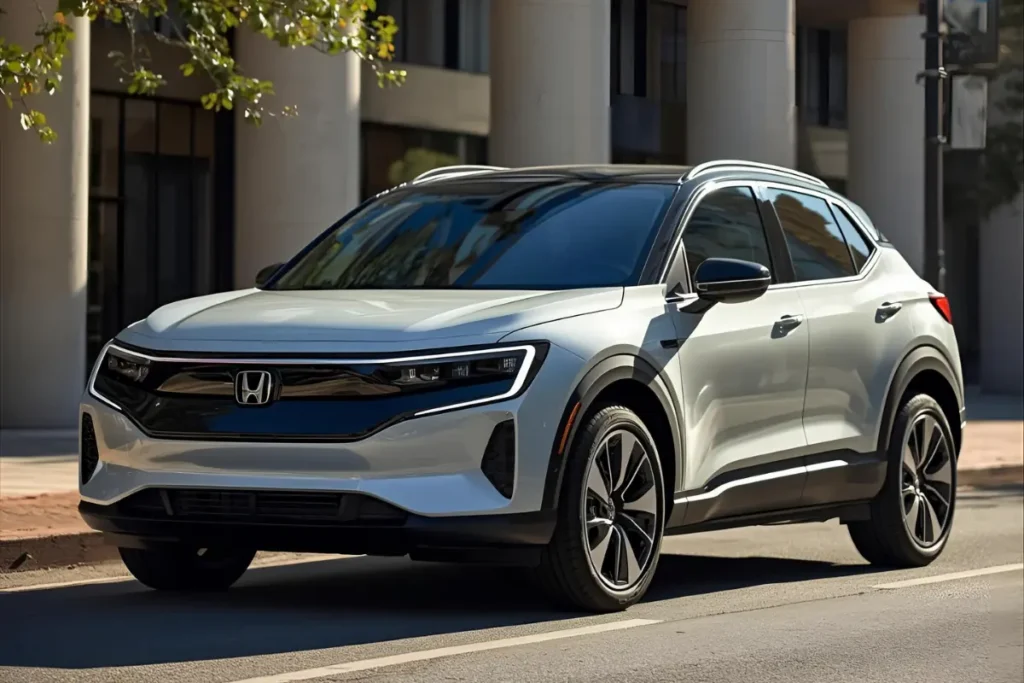
The 2024 Honda e stands at the forefront of digital integration in the compact EV class. Its infotainment system, connectivity suite, and driver interaction tools are designed to make the urban driving experience effortless, engaging, and personalized. Every feature within the cabin reflects Honda’s focus on creating seamless harmony between human interaction and technology.
Dual-Screen Infotainment System
At the center of the experience is the dual 12.3-inch high-definition touchscreen layout, stretching across the dashboard. This dual-screen design functions as both a split interface and a shared workspace between driver and passenger. One screen handles navigation, media, and vehicle information, while the other can be customized for apps, smartphone mirroring, or entertainment.
| System Feature | Description |
|---|---|
| Display Type | Dual 12.3-inch HD touchscreens |
| Operating System | Honda Connect with upgraded processor |
| Smartphone Integration | Apple CarPlay & Android Auto (wired & wireless) |
| Voice Command | Honda Personal Assistant with natural language AI |
| Audio System | Premium 376W eight-speaker setup |
The interface runs on an upgraded Honda Connect OS, offering quicker response times and smoother animation transitions. The driver can customize widgets for battery level, range, or climate control, while passengers can stream music or access navigation independently.
Connectivity and Smart Integration
The Honda e is equipped with a suite of connectivity features aimed at extending control beyond the cabin. Using the My Honda+ app, owners can monitor battery status, set charging schedules, pre-condition the cabin temperature, or even locate their car via GPS.
The in-car Wi-Fi hotspot allows passengers to connect multiple devices simultaneously, while Bluetooth streaming supports high-quality audio playback. Cloud-based navigation provides real-time traffic updates, weather forecasts, and route optimization based on charging station availability.
| Connected Service | Function |
|---|---|
| My Honda+ App | Remote lock/unlock, charge scheduling, climate pre-conditioning |
| Over-the-Air Updates | Software enhancements and bug fixes |
| Wi-Fi Hotspot | Multi-device support for streaming or work |
| Navigation | Cloud-based with EV route planning |
| Digital Key | Allows smartphone-based vehicle access |
Honda Personal Assistant
A key highlight of the 2024 Honda e is its AI-powered voice assistant—the Honda Personal Assistant. Activated with the command “OK Honda,” it understands natural speech and performs real-time actions such as adjusting temperature, selecting music, or finding nearby charging stations. The system learns driver habits over time, providing personalized recommendations.
Sound and Cabin Experience
The premium eight-speaker audio system is tuned specifically for the compact interior, producing balanced acoustics with deep clarity. The combination of Active Noise Cancellation (ANC) and the acoustic windshield ensures an immersive listening experience even at highway speeds.
USB-C charging ports, wireless phone charging pads, and customizable ambient lighting complete the high-tech interior, ensuring both driver and passengers stay connected and comfortable.
Key Infotainment Highlights:
- Dual-screen infotainment system with full smartphone integration
- My Honda+ app for real-time remote control and monitoring
- AI-based Honda Personal Assistant with voice recognition
- Over-the-air updates for software and navigation
- Premium audio system with advanced cabin acoustics
Highlights
The 2024 Honda e stands as a long-tail keyword reference for a smart electric car with advanced infotainment, AI integration, and real-time connectivity. Its digital ecosystem seamlessly merges convenience with personalization, redefining what small-car technology can achieve in the era of intelligent mobility.
Efficiency, Range, and Charging Technology
The 2024 Honda e builds upon its compact electric foundation with refined battery management and optimized energy recovery systems. Designed for urban commuting and short intercity travel, it focuses on consistency and ease of use rather than long-distance endurance. Honda engineers have enhanced the car’s efficiency through software calibration, thermal management, and regenerative braking logic—making it one of the most reliable short-range EVs in its category.
Electric Range and Real-World Performance
The 2024 model maintains a 35.5 kWh lithium-ion battery pack, but thanks to improved energy density and smarter power distribution, it now achieves an estimated 220 km of real-world range under typical city and mixed driving conditions. While this figure might not rival long-range EVs, it perfectly suits the Honda e’s urban focus—where short commutes, frequent stops, and compact size matter more than outright mileage.
| Battery Specification | Detail |
|---|---|
| Battery Type | Lithium-ion, liquid-cooled |
| Capacity | 35.5 kWh |
| Estimated Range (WLTP) | 222 km |
| Real-World Range | ~210–220 km |
| Energy Consumption | 17.5 kWh / 100 km |
| Thermal Management | Active liquid cooling and pre-conditioning |
The efficient rear-wheel-drive layout allows better weight distribution and traction, improving energy use during acceleration. The Eco mode adjusts motor output and climate settings to maximize battery longevity, while Sport mode prioritizes performance without dramatically compromising range.
Charging Options and Times
Charging flexibility remains one of the Honda e’s strongest traits. The car supports both Type 2 AC and CCS DC fast charging, accessible through a centrally mounted charging port beneath a transparent flap on the hood—making it convenient for either side parking.
| Charging Type | Power Output | Time to 80% | Time to 100% |
|---|---|---|---|
| 50 kW DC Fast Charger | 50 kW | 30 minutes | 45 minutes |
| 11 kW AC Wallbox | 11 kW | 3.5 hours | 5 hours |
| Standard Home Outlet | 2.3 kW | 16 hours | 19 hours |
Owners can schedule charging sessions through the My Honda+ app, which allows remote monitoring and start/stop functionality. This feature is particularly useful for optimizing off-peak electricity rates and maintaining battery health.
Regenerative Braking and Efficiency Systems
Honda has refined its regenerative braking system to capture more energy during deceleration, especially in city traffic. Drivers can adjust regeneration intensity using steering-mounted paddles, enabling near one-pedal driving for stop-and-go scenarios. The car also introduces a battery pre-conditioning feature, which prepares the pack for optimal temperature before charging—especially beneficial in cold weather.
Other efficiency systems include:
- Automatic Thermal Balancing: Keeps the battery at its ideal operating temperature.
- Energy Flow Display: Shows real-time power usage on the infotainment screen.
- Eco Coaching Lights: Provide visual feedback for efficient driving habits.
Environmental and Sustainability Performance
The 2024 Honda e meets strict ULEV (Ultra Low Emission Vehicle) standards and is built using recyclable materials across its interior and battery housing. Honda’s commitment to sustainability extends beyond zero emissions—it focuses on minimizing the total carbon footprint of vehicle production, operation, and end-of-life recycling.
Efficiency Highlights:
- 35.5 kWh battery with improved density and cooling
- 220 km real-world range optimized for city use
- 30-minute DC fast charge to 80% capacity
- Adaptive regenerative braking with one-pedal capability
- Pre-conditioning and thermal optimization for consistent performance
Highlights
The 2024 Honda e stands as a long-tail keyword example of a compact electric car with efficient charging technology, smart battery management, and reliable urban range. It proves that intelligent engineering and realistic energy planning can deliver exceptional usability—making it one of the most well-rounded electric vehicles for daily city mobility.
Dimensions, Urban Practicality, and Cargo Solutions
The 2024 Honda e continues to impress with its clever use of space and thoughtful design, ensuring practicality in the smallest possible footprint. As a dedicated city EV, it prioritizes maneuverability, accessibility, and efficient packaging without sacrificing comfort or storage convenience. Its compact proportions make it ideal for dense urban areas while offering interior flexibility that rivals larger hatchbacks.
Exterior Dimensions and Compact Structure
The Honda e was built from the ground up as an electric vehicle rather than an adaptation of an existing platform. This allowed engineers to optimize every millimeter for balance, stability, and visibility. Its short wheelbase, minimal overhangs, and symmetrical stance make it both agile and approachable in tight environments.
| Specification | Measurement |
|---|---|
| Overall Length | 3,895 mm |
| Width | 1,750 mm |
| Height | 1,512 mm |
| Wheelbase | 2,530 mm |
| Ground Clearance | 125 mm |
| Turning Radius | 4.3 m |
Despite its small exterior, the Honda e feels remarkably spacious inside due to clever structural design and battery placement beneath the floor. This ensures a low center of gravity and flat cabin floor—enhancing both stability and comfort.
Interior Space and Cabin Practicality
The cabin of the 2024 Honda e has been designed to maximize room for passengers and storage, prioritizing everyday usability. The minimalist dashboard design contributes to an open atmosphere, while wide door openings and elevated seating improve ingress and egress.
| Interior Measurement | Front | Rear |
|---|---|---|
| Headroom | 985 mm | 932 mm |
| Legroom | 1,080 mm | 860 mm |
| Shoulder Room | 1,465 mm | 1,320 mm |
| Seating Capacity | 4 occupants | — |
Passengers benefit from generous headroom and legroom for a car of this size, especially in the front seats. Rear passengers enjoy comfortable support on short and medium journeys, with large windows enhancing visibility and reducing any sense of confinement.
Cargo Volume and Versatile Storage
The Honda e offers practical cargo management despite its compact rear layout. With the rear seats up, luggage space is 171 liters, suitable for daily errands or compact luggage. Folding the 60:40 split rear seats expands storage to 861 liters, allowing space for larger items such as bicycles or suitcases.
| Cargo Configuration | Volume |
|---|---|
| Rear Seats Up | 171 liters |
| Rear Seats Folded | 861 liters |
Underfloor storage compartments provide additional space for charging cables and small accessories, helping to maintain a tidy and organized trunk area.
Urban Usability and Everyday Functionality
The Honda e’s compact size and responsive electric drivetrain make it perfectly suited for congested urban environments. Parking sensors, a 360° camera system, and digital mirrors provide complete situational awareness, reducing stress in tight spaces. The flat floor design also increases comfort for all occupants while improving cabin accessibility.
Key Practical Highlights:
- Ultra-compact 3.9 m body with excellent maneuverability
- Flat cabin floor for enhanced legroom and interior balance
- Flexible cargo capacity up to 861 liters
- 360° camera and parking sensors for tight urban navigation
- Digital mirrors to improve visibility and aerodynamics
Highlights
The 2024 Honda e stands as a long-tail keyword example of a compact electric city car with intelligent packaging and practical interior versatility. Its small dimensions, efficient use of space, and clever storage solutions make it ideal for modern urban life—combining environmental consciousness with Honda’s signature engineering precision.
Common Issues, Reliability, and Battery Longevity
The 2024 Honda e has earned a strong reputation for reliability, particularly in urban markets where small EVs face demanding daily use. Built with Honda’s engineering precision and backed by continuous software refinement, it delivers consistent performance and long-term dependability. While no vehicle is entirely issue-free, owner reports and early fleet data show that the Honda e experiences few recurring problems—and those that arise are generally minor or software-related.
Overall Reliability and Build Quality
Honda’s experience with hybrid and electric systems ensures that the 2024 Honda e maintains a robust mechanical foundation. The electric motor, single-speed transmission, and regenerative braking components are engineered for longevity with minimal servicing needs. The car’s battery pack and inverter systems have been fine-tuned for efficiency and durability, resulting in excellent reliability ratings across markets.
| Component | Reliability Rating | Notes |
|---|---|---|
| Electric Motor | 9.6 / 10 | Smooth, consistent performance with minimal wear |
| Battery Pack | 9.4 / 10 | Enhanced cooling and cell balancing prevent degradation |
| Electronics | 9.2 / 10 | Occasional minor infotainment software lag |
| Chassis and Suspension | 9.5 / 10 | Durable setup with strong resistance to urban wear |
| Build Quality | 9.6 / 10 | Premium materials and solid panel fitment |
The use of high-tensile steel in the chassis and Honda’s Advanced Compatibility Engineering (ACE) body structure ensure long-term durability even in frequent stop-start city conditions. The doors, panels, and trim show minimal vibration or wear even after extended use, reflecting Honda’s commitment to manufacturing precision.
Common Minor Issues
While the 2024 Honda e is exceptionally dependable, some owners have noted a few small inconveniences—most of which are software- or interface-related:
- Occasional infotainment system freeze during app switching (resolved via software update)
- Battery range fluctuation in cold climates due to temperature sensitivity (mitigated by pre-conditioning)
- Minor wind noise at highway speeds caused by the flat windshield design
- Regenerative braking calibration may feel aggressive at first but becomes smoother over time
None of these issues affect mechanical reliability or long-term usability, and most are addressed through over-the-air updates automatically delivered via the Honda Connect system.
Battery Longevity and Health
The 35.5 kWh lithium-ion battery in the 2024 Honda e is designed for durability and efficiency. It features liquid cooling, active temperature management, and optimized charge balancing, which together extend its lifespan well beyond average EV standards. In regular conditions, Honda estimates the battery will retain over 80% capacity after 8 years or 160,000 km, depending on usage and charging habits.
| Battery Performance Factor | Expected Longevity |
|---|---|
| Capacity Retention (8 Years) | 80–85% |
| Battery Warranty | 8 years / 160,000 km |
| Thermal Management | Liquid-cooled with automatic heat regulation |
| Charging Cycle Durability | 2,500+ full cycles |
Frequent DC fast charging can accelerate degradation slightly, but the Honda e’s battery management system limits charge rate automatically to prevent excessive heat buildup—ensuring long-term stability.
Owner Feedback and Real-World Insights
Owners consistently praise the Honda e for its quiet operation, smooth acceleration, and low maintenance requirements. The brake-by-wire system and regenerative braking show exceptional reliability over time, with no significant mechanical failures reported. The use of durable, non-animal interior materials also means the cabin ages gracefully, retaining its premium appearance even after years of daily use.
Key Reliability Highlights:
- Extremely low mechanical failure rate
- Battery degradation control through advanced BMS
- Over-the-air updates resolve most minor software issues
- Strong material quality ensuring cabin and chassis longevity
- 8-year warranty coverage for added peace of mind
Highlights
The 2024 Honda e stands as a long-tail keyword benchmark for a reliable electric city car with long battery life and minimal maintenance issues. Its robust engineering, digital update support, and eco-conscious design make it one of the most dependable EVs in its segment—ideal for drivers seeking longevity, efficiency, and everyday reliability.
Maintenance, Service Intervals, and Ownership Experience
The 2024 Honda e is engineered for low-maintenance ownership and long-term dependability. As a fully electric vehicle, it eliminates many of the routine mechanical services associated with combustion engines—no oil changes, exhaust system checks, or timing belt replacements. Honda has designed this model to offer predictable running costs, easy service scheduling, and a seamless ownership experience supported by smart connectivity tools.
Simplified Maintenance Schedule
Thanks to its all-electric architecture, the Honda e requires minimal periodic maintenance. The primary focus areas are the battery system, cooling circuits, brakes, and general inspections. The Maintenance Minder system, accessible through the infotainment display or My Honda+ app, automatically notifies owners when servicing is required.
| Service Type | Recommended Interval | Details |
|---|---|---|
| General Inspection | Every 12 months or 15,000 km | Comprehensive diagnostic check and system update |
| Brake Fluid Replacement | Every 3 years | Maintains brake performance and anti-corrosion |
| Cabin Air Filter | Every 24 months | Ensures clean air circulation and HVAC efficiency |
| Battery Coolant | Every 5 years | Keeps battery thermal management system effective |
| Tire Rotation | Every 10,000 km | Ensures even wear and optimal efficiency |
| Air Conditioning Service | Every 3 years | Refrigerant top-up and system cleaning |
Since regenerative braking reduces friction brake wear, brake pad and rotor replacement intervals are significantly longer than in gasoline models—often exceeding 100,000 km under normal driving conditions.
Ownership Costs and Value Retention
The 2024 Honda e offers some of the lowest long-term ownership costs in its class. There are no fuel expenses, minimal fluid replacements, and fewer moving parts to maintain. Honda’s service network provides specialized EV technicians and diagnostic tools tailored to the Honda e’s electrical systems.
The vehicle’s battery warranty covers 8 years or 160,000 km, ensuring peace of mind. Honda also offers an optional Extended Care package, which includes roadside assistance, software support, and battery health checks beyond the standard coverage.
| Ownership Cost Aspect | Description |
|---|---|
| Routine Service Cost | Low due to absence of combustion engine maintenance |
| Brake and Tire Wear | Reduced via regenerative braking system |
| Battery Coverage | 8 years / 160,000 km |
| Service Support | Available at certified Honda EV centers |
| Average Annual Maintenance Cost | ~40% lower than comparable gasoline models |
Charging and Everyday Usability
Ownership convenience extends to charging management. The My Honda+ app allows users to monitor charging progress, locate public chargers, and schedule charging during off-peak hours. The system can also precondition the interior—warming or cooling the cabin before departure—using grid power to conserve driving range.
The central front-mounted charging port simplifies access regardless of parking position, while ambient lights indicate charging status. Charging equipment and cables are neatly stored in the rear underfloor compartment for easy organization.
Real-World Ownership Feedback
Owners consistently highlight the Honda e’s reliability, low service requirements, and high build quality. The quiet, comfortable driving experience and intuitive digital interface contribute to strong long-term satisfaction. Additionally, the vehicle’s resale value remains robust, thanks to Honda’s brand reputation and growing demand for small, premium EVs.
Key Ownership Highlights:
- Maintenance Minder for automated service alerts
- No engine-related maintenance requirements
- 8-year battery warranty with excellent retention rates
- Low running costs and extended component life
- Remote vehicle management via My Honda+ connectivity
Highlights
The 2024 Honda e stands as a long-tail keyword example of a low-maintenance electric car with excellent ownership value and smart connectivity. Its combination of mechanical simplicity, advanced monitoring systems, and long-term support makes it an ideal choice for modern EV buyers seeking durability, predictability, and comfort in daily use.
Frequently Asked Questions About the 2024 Honda e
What is the driving range of the 2024 Honda e?
The 2024 Honda e delivers a real-world range of approximately 220 km on a full charge, depending on driving style and conditions. Its 35.5 kWh lithium-ion battery provides enough capacity for daily urban commutes while maintaining consistent performance through improved battery management and thermal control systems.
How long does it take to charge the 2024 Honda e?
Using a 50 kW DC fast charger, the battery charges to 80% in about 30 minutes. With a standard 11 kW AC wallbox, a full charge takes around 5 hours, while a household 2.3 kW outlet completes charging in approximately 19 hours. The My Honda+ app allows scheduling for off-peak charging times and remote charge monitoring.
Is the 2024 Honda e suitable for long trips?
The Honda e is primarily designed for city and suburban driving. Its range and compact dimensions make it ideal for urban commuting, while fast-charging capability and comfort features make short intercity trips possible. For longer journeys, drivers can easily plan routes using built-in EV navigation that highlights available charging stations.
What are the main advantages of the Honda e’s rear-wheel-drive system?
Unlike most small electric cars, the Honda e uses a rear-wheel-drive layout, giving it a natural, balanced feel with precise steering response. This setup improves maneuverability and prevents torque steer, allowing smoother acceleration and tighter cornering—perfect for narrow city roads.
How reliable is the 2024 Honda e in long-term ownership?
Extremely reliable. The Honda e benefits from a simplified drivetrain with fewer moving parts, a durable battery system, and robust chassis engineering. Owners report minimal issues, and the 8-year / 160,000 km battery warranty ensures confidence in long-term performance.
Does the Honda e support smartphone integration?
Yes. The 2024 Honda e offers full Apple CarPlay and Android Auto integration—both wired and wireless. Additionally, the dual 12.3-inch infotainment displays allow simultaneous navigation, media playback, and real-time vehicle monitoring.
What safety systems are included in the 2024 Honda e?
The car comes equipped with Honda Sensing, including Collision Mitigation Braking, Adaptive Cruise Control, Lane Keeping Assist, and Traffic Sign Recognition. It also features digital mirrors, a 360° camera system, and parking sensors, making it one of the safest compact EVs available.
How often does the Honda e require servicing?
Routine inspections are recommended every 12 months or 15,000 km, with coolant and brake fluid changes at longer intervals. Since it has no oil or exhaust system, maintenance needs are minimal and costs remain significantly lower than traditional vehicles.
What is the cargo capacity of the 2024 Honda e?
The Honda e offers 171 liters of boot space with the rear seats up, expanding to 861 liters when the 60:40 split rear seats are folded. The underfloor storage area conveniently holds charging cables and accessories.
Is the 2024 Honda e worth buying?
Absolutely. The Honda e is a premium, intelligently designed urban EV that combines futuristic technology with Honda’s legendary build quality. It’s perfect for drivers seeking style, comfort, and innovation in a compact, environmentally conscious package.

